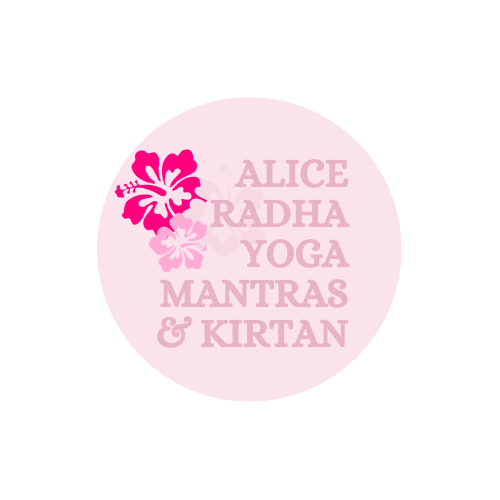This summer I wanted to know, how it actually is to live “off the grid”, meaning to live without water, electricity and internet. To dream of living in the countryside away from civilization is one thing, to actually do it, another. So I searched for three destinations in Spain to do the self-test. First of all, I participated in the Spanish “Burn”, the “Nowhere Festival” near Barcelona. Then I visited a friend on an organic farm near Coin and finally drove to the Alpujarras for a silence retreat. I will describe one trip in three blog entries. The whole thing with the focus on water, electricity, telephone and toilets “off the grid”.
A journey from loud to quiet.
Trip Number 1: Going Nowhere!
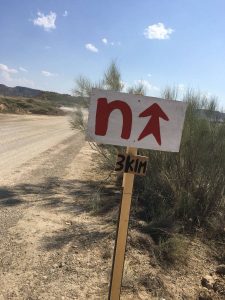
Going Nowhere
In July, I made my way to Barcelona to meet a friend. From there we took a rental van in the direction of Zaragoza to the desert near Monegros. The landscape is unique and reminds me a little of the Atlas Mountains in Morocco. The rock formations tower magically into the sky. The festival grounds are located on a flat land in front of the mountains, behind them fields and a river. It is not so far away from civilization and I even had phone reception. I have to say, I was a little disappointed. I thought that we were indeed cut off from the outside world. Since I had previously unsubscribed from everyone as a precaution, I actually only used the phone to contact my friend. So, it was in the van all day. And that is already the first positive point of the festival. I never had the feeling that someone was stealing anything from me. The van was parked in our camp and the door was never locked. A nice and safe feeling.
Going Nowhere
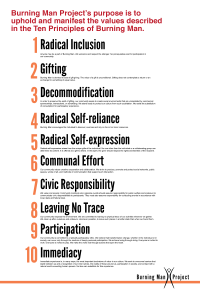
10 principles of Burning Man
The Spanish “Burn” follows the 10 principles of the Burning Man, of which I am particularly interested in the sustainable aspect. Once a year, people from all over the world come together for a week to build a festival city. After the end of the festival you should see nothing but a foot or tire imprint of it. A real challenge.
There are two types of visitors. Some are free campers, they have to bring everything they need for a week: tent, water, electricity and food. The others join a camp, which provides for the basic food. We did that. We also left the tent at home and brought a mobile home in the form of a van. This was also for logistical reasons, since you cannot take so much luggage arriving by plane. The journey into the desert was no problem. It was a relaxed “road trip” from Barcelona.
Most camps have a container that is brought to the site where the most important utensils are located before the festival starts. This includes a water tank and a power generator. Even if this is a kind of luxury, nevertheless, economical consumption is requested. Finally we are in the desert.
Water is the most precious thing.
If you do not have water in large amounts, then you realize why. It starts already in the morning when brushing your teeth. We had a canister of drinking water that was chlorinated for hygienic reasons. A water bottle is essential. This is like your best friend that you always want to have near you. Without a bottle you will never move away from your water source. From the bottle you take a little water in the mouth and brush your teeth. In order not to destroy the ecosystem, biodegradable products are desired or simply brushed vigorously. I’ve learned that that’s the most important part of teeth cleaning up anyway. The toothpaste is only for the good feeling, the smell or for the wallet of the manufacturer. At the end you spit into a container of sand, which is then disposed of properly. Even if it may sound disgusting at first, sand over it is really a nice thing.
I’ll go into detail
Showering is done with so-called shower pumps, which are used in camping. The best option is to have one person stand up and, like Leonardo da Vinci or the airport scan, you raise your arms and spread your legs. The other person then sprays you with water mist from top to bottom. The second step is that you soap yourself and the third step is like the first, water spraying. For women, like me with long hair, a challenge, but at the end of the day it does not matter anyway. Because we are in the desert. So it is blazingly hot and there are regular sandstorms.
In the end, everything is covered with a light layer of sand after a few days anyway.
So also the dishes. The best washing station does not help either. Usually there are three plastic bowls with water. In the first one food scraps are scrubbed, in the second one dishes are cleaned with ecological dish cleaner and in the third the dishes are rinsed through clear water. If the first bowl is too dirty, the food scraps are sifted through a filter and go into the garbage-recycle system. Each camp has its own garbage bins for glass, plastic, paper, bio and residual waste. This is then transported to the central refuse dump and sorted under the watchful eye of the trash manager in the local container. The old water is also disposed of professionally at the waste station. For the wash station this means that the two remaining plastic trays are pushed to the left. Fresh water comes in the first tub and it is placed in third position. With this system, you can wash a lot of dishes with minimal water consumption. As already said, a sandstorm and everything is again covered with sand-grained.
Dirt cleanses the stomach, that is an old German saying.
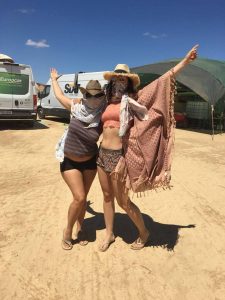
Desert Kings
The sand is not harmful. It’s the heat that bothers you. Therefore, there is also a water canister filled with electrolyte-water. As you can see, the camps are perfectly attuned to the water situation at the Nowhere Festival. The water consumption per camp member is calculated in advance and the required amount ordered accordingly from the local water supplier. Every day a water truck drives over the camp and replenishes the water tanks when needed (this is prepaid).
Food is cooked with the drinking water. I was lucky enough to be in a “yoga camp” and I have to say that food was just great. We had a fridge! Every day there was fresh salad, fruits and vegetables, plus options for a gluten free diet. What luck for me as just before a wheat intolerance was found in me. Good food with plenty of minerals and vitamins is important in such an environment. That was one of the reasons why I wanted to go to a camp. And “Now and Here” has years of experience and equipment to look after the wellbeing of camp members. This is not the same in every camp as I noticed from observing others. White bread and canned food for a week, this I cannot do anymore …
Cooking is done with gas. The electricity is primarily there for the light. Lighting plays a big role in Nowhere, especially at night when the party starts. Even people hang fairy lights around to shine brighter and to be seen. If you walk across the grounds at night, you will see artful light installations, some of them are also operated with LED. I saw solar panels more often with the free tenting people. Most of the camps have, as already mentioned, their own generator. That works quite well. Only when trying to make crushed ice with a blender, did we ever have a failure. It would have been nice, in the heat, so nice …
Ice cubes are the only thing you can buy on the festival grounds. Everything else is paid in advance and / or brought along. On the site itself, everything is “gifted”, there is no money transfer. That’s one of the principles of the “Burners”.
I gave a Voice-Opening-Workshop with another lovely camp member and a Kirtan. Such a nice experience with people approaching me later to thank for finding their voice again and offering a space for mantra-chanting. Additionally I got gifted a hands-craft brooch and a picture of the hindu gods from two participants.
Burners, how should it be different, have to go to the bathroom. I had expected compost toilets. There are many of them now. These were used the year before at the Nowhere. But due to the weather and hygiene situation they proved unsuitable. A pity. So again the good old Dixie-loo. Although I would like to say that I have never seen such clean toilets at a festival. The so-called “Shit-Ninjas” did a great job and the toilets were cleaned regularly. And for the first time I understood how the Dixie-loos work best.
How do you actually behave on a Dixi toilet?
The instructions were clearly hung in every toilet, nothing can go wrong. Before you sit down, you can clean them with paper and disinfectant, both were always available. Then first use the foot pump to pump fluid into the toilet. I have never done that before. No one ever told me. Then sit down and do what you need to do. After you have to pump again and close the lid. Even with the lid closed, I have never done this before, probably it was always too disgusting. Then the hands are cleaned with disinfectant, leave the toilet and that’s it. So simple, so good. Works, according to the motto:
“Please leave the toilet the way you found it”
At night you need a headlamp, because between the individual camps there is no light. Neither on the paths to or in the toilets. Through the camper van we always had light as soon as the door opened. That would prove useful in the permanent search for something. On the one hand, you try to stow everything away well and thus keep away the sand. On the other hand, you always need something. I was very happy with the van, because apart from a home, it also offered a little noise protection.
What was the biggest challenge at the Nowhere Festival?
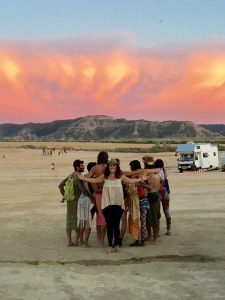
Nowhere Nights
I was always asked if I was “overwhelmed” by the festival. After all, it would all be new to me. Yes and no. I’ve been camping as a child and loved it. Therefore no, the deprivation of water, electricity and bathrooms is not new to me. Then the heat. I live in Malaga most of the year, I’m used to high temperatures. Then the many people who are running around half naked on the festival grounds. As I said, I live in Málaga and in the summer everybody runs around half naked anyway. In addition, I have already visited nudist-beaches and have no problem with it. Then the many people in fancy-dress walking around. I am from Cologne and grew up with carnival. Again, no problem. Everything together in one place, I had not experienced that before, but neither was that a challenge for me. There is only one reason why I would not go to the “Nowhere Festival” again, namely the nightly parties.
It’s just too loud at night to sleep
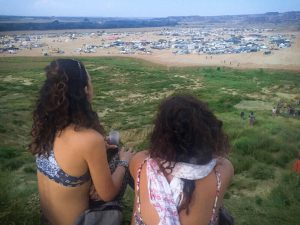
View over the Festival
In “off the grid” one could assume that electricity is used sparingly. Not at Nowhere, not at the party camps. I am still amazed at what kind of equipment the festival participants took to the desert. With the power of the music systems and boxes, all this must have cost a fortune. Many people appreciate it, but it was a torturous experience for me. The only “Curfew”, i.e. the rest period, should be between 7 and 11 o’clock in the morning, but even that was not kept. So, I had not slept deeply for 7 days. Although the van may have kept some sound waves away, I also felt the vibrations of the bass at night as the car adjusted to the movements. Armed with ear plugs and a parking space on the supposedly quieter part of the area, I wanted to sleep at night. Wrong! There are people who can sleep despite the volume. I cannot. I would not call myself “hyper-sensitive”, but when it comes to sleep, I need a quiet environment. There is even a camping part called the “silent” zone. But that is more true for the people who camp there. It is basically the case that the wind carries the sound miles over the terrain without losing even a decibel in volume. There are only two options: Either you just join the party or you can sleep in spite of the volume.
For me, I like being awake during the day and enjoying the light of the day. At any rate, the times when I spent all night going out are over. A festival where I cannot sleep at night is therefore not for me. Too bad, because in general I think the festival is very successful, and also the sustainability is implemented very nicely. Although I was not there until the end of the dismantling, there was hardly anything left to be seen from the festival when the last ones left the field.
I only wanted silence and sleep.
So I immediately went to the countryside and visited a friend on her organic farm. Total rest at night, what a relief. More about this in the next blog.
